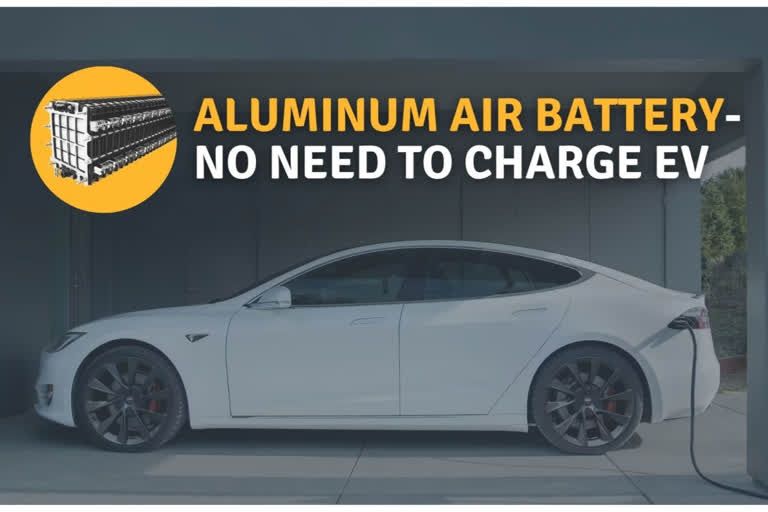Hyderabad: The Indian Oil Corporation (IOC) is currently working on battery-powered cars that do not require electrical charging. In an exclusive interview with ETV Bharat, Dr S.S.V. Ramakumar, Director of Research & Development and Board Member of the Indian Oil Corporation spoke about the extensive changes the automobile sector will undergo after the 'Aluminium powered batteries' become available in the market.
"There is no need for electricity to recharge the battery. Mileage is high compared to the current battery in the market. More safety and no threat of pollution. It can be changed as we do with the Cooking gas cylinder. No need to import manufacturing resources. Aluminium, which is abundantly available domestically, is the key," says Dr Ramakumar.
According to Dr Ramakumar, Aluminium batteries do not require recharging. "As these batteries do not require electricity, you don't need to recharge them. There is no fear of the battery exploding. When the charging runs low, the battery can be replaced in minutes at a petrol station or outlet. This is like replacing a cooking gas cylinder. Companies supply cars without batteries when purchased. A deposit for the battery is like a deposit for a cooking gas cylinder. The amount of the deposit and the price of the battery exchange has not been finalized yet. The vehicle maintenance costs are reduced by 50 per cent when compared to lithium batteries", he added.
On the availability of the batteries in the market, Dr Ramakumar responded, "The first-stage batteries will be available in the country by the end of 2024. There is a good chance that the suitable vehicles will also arrive by then". "Research is in the final stage. Recently, a three-wheeler equipped with an aluminium air battery travelled 450 kilometres. If the same vehicle is driven using a lithium battery, it gets 80 to 100 km", he further added.
About their partnerships with automobile companies, he replied, "We have tied up with Maruti, Mahindra & Mahindra, and Tata Motors to manufacture these battery-powered vehicles. In the field, we found that Tata Motors' cars can travel more than 500 kilometres using an aluminium battery. Maruti, Mahindra & Mahindra companies are also conducting experimental tests. We aim to make our mark in reducing pollution".
Regarding the research of making batteries out of aluminium, he explained, "A study on making batteries with natural resources that do not rely on imports has identified aluminium as key. The fact that those deposits are plentiful is also a plus point. The government responded positively. We explored whether research is being done on aluminium anywhere in the world and found out that Bar-Ilan University (BIU) of Israel had done this research".
Also read: Canada to commercialise world's first photonic-based quantum computer
On their contract with Phinergy, he explained, "When we contacted Bar-Ilan University, we were told that they had sold the patent and research to a start-up company called Phinergy (Israel) that works with metal-air technology (turning abundant metals into clean energy carriers), so we contacted that company and agreed to manufacture batteries with that technology in India. This is a joint venture in the ratio of 50:50. In the first phase we will sell it in the Indian market, but also do exports".
Upon being questioned regarding the maximum mileage of these vehicles, he responded, "Lithium has an energy density of four kilowatts per kilogram, while aluminium provides eight kilowatts per kilogram. At present we are extracting only four kilowatts of density. Our scientists are conducting joint research with Phinergy to further improve this concentration. As this density increases, the mileage increases. If the density increases from six to seven kilowatts, the mileage increases up to 800 kilometres".
Dr Ramakumar stated that "Tesla figured out aluminium technology before us. By that time, the research done by BIU was not satisfactory and Tesla backed down. After that, the research done by Phinergy gave good results and the IOC went ahead with the agreement". "Aluminium battery plays a very important role not only for motorists but also in the economy of the country. Aluminium deposits in the country are huge. As this battery is used in vehicles, it transforms into active aluminium trioxide. Aluminium can be recycled from it. We have tied up with Hindalco Industries for this regeneration. An aluminium battery can be used for at least 50 per cent less than the cost of a lithium battery", he further added.
When asked about the aluminium battery's invention, he responded, "The basic research conducted by the University of Israel, a startup in the same country sharpened the aluminium-air battery research, while the Indian Oil Corporation refined it and invented it. This is a revolution in the automotive sector. Not only that, the maintenance cost for the motorist will be reduced by more than half. The mileage will increase further if the findings are more conclusive. These batteries will be available by the end of 2024".
Hailing from Machilipatnam, Andhra Pradesh, S.S.V. Ramakumar studied M.Sc. (Chemistry) at a University in Andhra. He received his doctorate from IIT, Roorkee. He is involved in many types of research for more than three decades and more than 150 research papers written by him have been published in various national and international journals. He has around 55 patents individually registered to his name and during his tenure, Indian Oil Corporation obtained more than a thousand patents. He is the recipient of many prestigious awards and was a board member and consultant in many organizations in the country and around the globe.



